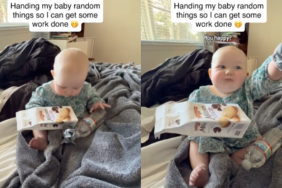Migraines and headaches have been a part of my life since I was a child. They can prevent me from functioning for a day, or come in a stop-and-go cluster that messes up an entire week. Managing a health issue like this is an ongoing process, something always on my mind, even on the good days. I know I’m not the only mom who gets migraines, for approximately 85% of chronic sufferers are women.
As a mom—a working mom, at that, whose husband often works late or travels—I’ve had to find a way to parent as a person whose everything can come to a screeching halt because of my brain. I have not been shy about telling my kids my needs when I’m down for the count, and they always rose to the occasion. They became caregivers. While it’s certainly not a situation I had hoped for, I believe my children are becoming better humans because of it. Here are some of the positive lessons and habits they have learned over the years while living with a mom who gets migraines.
Some Ailments Are Invisible
At first glance, I may look like a perfectly healthy person out and about with her children. You can’t see anything amiss while I am experiencing a migraine prodrome (uncomfortable symptoms of a particular susceptibility to a full-on migraine attack) and am trying to manage my exposure to triggers (incoming storms, dehydration, glaring sunlight reflections, strong smells) so things don’t escalate. My kids know to trust me when I tell them how I feel, even if I appear well. This carries over to other people, too. They don’t need to see a wheelchair, cast, or other obvious visual signal to believe someone has a condition that requires assistance or an adjustment of their own expectations of that person.
Chip in When Needed
Sometimes I can tell when a migraine is coming my way; other times they sideswipe me. My kids have learned to manage change without warning. That could mean getting me set up in a dark basement with my medication and a giant water bottle instead of expecting me to cook dinner, arranging a carpool to something I can no longer drive them to, or maybe even missing out on an activity we had planned to do together. My kids have learned to accept these unfortunate surprises, and have proven to themselves that not only can they manage switching gears, they can do so in a way that helps the person in need.
It can be scary to hear your mom tell you that she’s starting to lose her eyesight due to an aura migraine, so you need to drop everything and drive home right now. My son and daughter pull themselves together in spite of any fear, and become helpers. They dim lights, get an ice pack for my head, and make themselves a dinner just as good as the one I planned for them. When I’m suffering, I can’t walk them through every step of what to do when I can’t do it, and they’ve learned how to take initiative, pay attention to details, and balance caregiving for me with taking care of their own needs, too (like getting their regular chores done as well as whatever I was in the middle of).
Understand That Recovery Takes Time
While migraine attacks typically last anywhere from 4-72 hours, it doesn’t stop there. Once the pain is gone, my brain can still feel bruised, sensitive. I often feel dumbed-down: losing words, forgetting things. I don’t dive right back into life to immediately “make up” for being benched by a migraine—that’d be like punishing myself. I ease back into life, prioritizing what I can do, and delegating (or skipping) what I can’t yet. My wellbeing comes first, even if that delays everything else a little bit.
My kids know to be gentle with me, they understand that it takes time to properly heal. They’re patient, giving me the space and continued help I need until I’m fully back on my feet (on my brain?) again. I also see them giving themselves the same lenience after their own illnesses and injuries, too. They’re smarter about not re-injuring themselves, and listen to their bodies.
Self-Care Is Prevention
It’s not hard to tell that taking care of my physical and mental health as default is a rule I live by. I pamper myself when I need it, and bask in happy things when I can find them. I go to all my annual physicals and take my doctors’ advice, because when you’re not nice to your body, it’s not going to be nice back. Overall poor health, dehydration, staying up too late, bright phone screens, too much stress—all these things are avoidable, and if I don’t do so they can lead to headaches, or worse.
It’s not hard for my kids to connect the dots when they don’t follow my own advice and end up the ones who don’t feel good. Self-care isn’t selfish, it’s common sense. Why participate in making yourself feel ill when you can expend the exact same amount of energy and make yourself feel well, instead?
Homeopathic When Possible
Things are getting better now, but there was a long time when “homeopathic” was considered a practice only done by the kooky, instead of simply an attempt at remedying an ailment naturally. If I sense a headache or migraine coming on, I try drug-free solutions first: stretching, peppermint oil, long showers, heating pads, ice packs, food, caffeine, and epic amounts of water. A lot of times, the right combination will do the trick, proving to my kids once again that paying attention to your body can be quite effective.
The cool thing about this was how my kids had so many questions about the why and how all the things I tried worked. Talking them through it not only gave them a better grasp of how the body works, it got them in the habit of trying to problem-solve in this way when other things came up (physical or otherwise). Rather than slap together a quick fix, they try to find the root of the issue and start there.
Needing Prescription Medication is Not a Weakness
I’ll never understand why so many people are embarrassed by needing medication. Two hundred years ago, typical life expectancy was about thirty-five years. Thanks to modern medicine (and other things), we’ve more than doubled that. Our quality of life can be exponentially improved, as well, when we have an honest, communicative relationship with our doctor and find prescription medications that work how and when we need them. I feel no shame when I need one of my meds, and take them with the respect and caution they deserve.
My kids see my medication as something that technically fixes a body part but also helps my mind. I make a point to model careful consumption of medication as prescribed by my doctor as an positive thing, for all health is important: physical and mental. Because of this, they don’t bat an eye when they hear of a classmate or adult taking medication for either thing. No judgement, just acceptance.
Empathy, Helpfulness, and Acceptance
I never thought I’d say that being migraine prone has a plus side, yet here I am. Through living with a parent with an invisible medical condition, my son and daughter have inadvertently become kinder, more considerate people. They learned first-hand what it takes to be better caregivers of themselves, so they can also take better care of those around them—and I’m lucky for it.








